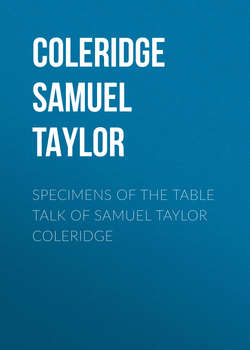Читать книгу Specimens of the Table Talk of Samuel Taylor Coleridge - Coleridge Samuel Taylor - Страница 44
TABLE TALK
May 7, 1830
ОглавлениеHORNE TOOKE.–DIVERSIONS OF PURLEY.–GENDER OF THE SUN IN GERMAN
Horne Tooke was pre-eminently a ready-witted man. He had that clearness which is founded on shallowness. He doubted nothing; and, therefore, gave you all that he himself knew, or meant, with great completeness. His voice was very fine, and his tones exquisitely discriminating. His mind had no progression or developement. All that is worth any thing (and that is but little) in the Diversions of Purley is contained in a short pamphlet-letter which he addressed to Mr. Dunning; then it was enlarged to an octavo, hut there was not a foot of progression beyond the pamphlet; at last, a quarto volume, 1 believe, came out; and yet, verily, excepting newspaper lampoons and political insinuations, there was no addition to the argument of the pamphlet, It shows a base and unpoetical mind to convert so beautiful, so divine, a subject as language into the vehicle or make-weight of political squibs. All that is true in Horne Tooke's book is taken from Lennep, who gave it for so much as it was worth, and never pretended to make a system of it. Tooke affects to explain the origin and whole philosophy of language by what is, in fact, only a mere accident of the history of one language, or one or two languages. His abuse of Harris is most shallow and unfair. Harris, in the Hermes, was dealing—not very profoundly, it is true,—with the philosophy of language, the moral, physical, and metaphysical causes and conditions of it, &c. Horne Tooke, in writing about the formation of words only, thought he was explaining the philosophy of language, which is a very different thing. In point of fact, he was very shallow in the Gothic dialects. I must say, all that decantata fabula about the genders of the sun and moon in German seems to me great stuff. Originally, I apprehend, in the Platt-Deutsch of the north of Germany there were only two definite articles—die for masculine and feminine, and das for neuter. Then it was die sonne, in a masculine sense, as we say with the same word as article, the sun. Luther, in constructing the Hoch-Deutsch (for really his miraculous and providential translation of the Bible was the fundamental act of construction of the literary German), took for his distinct masculine article the der of the Ober-Deutsch, and thus constituted the three articles of the present High German, der, die, das. Naturally, therefore, it would then have been, der sonne; but here the analogy of the Greek grammar prevailed, and as sonne had the arbitrary feminine termination of the Greek, it was left with its old article die, which, originally including masculine and feminine both, had grown to designate the feminine only. To the best of my recollection, the Minnesingers and all the old poets always use the sun as masculine; and, since Luther's time, the poets feel the awkwardness of the classical gender affixed to the sun so much, that they more commonly introduce Phoebus or some other synonyme instead. I must acknowledge my doubts, whether, upon more accurate investigation, it can be shown that there ever was a nation that considered the sun in itself, and apart from language, as the feminine power. The moon does not so clearly demand a feminine as the sun does a masculine sex: it might be considered negatively or neuter;—yet if the reception of its light from the sun were known, that would have been a good reason for making her feminine, as being the recipient body.
* * * * *
As our the was the German die, so I believe our that stood for das, and was used as a neuter definite article.
The Platt-Deutsch was a compact language like the English, not admitting much agglutination. The Ober-Deutsch was fuller and fonder of agglutinating words together, although it was not so soft in its sounds.
